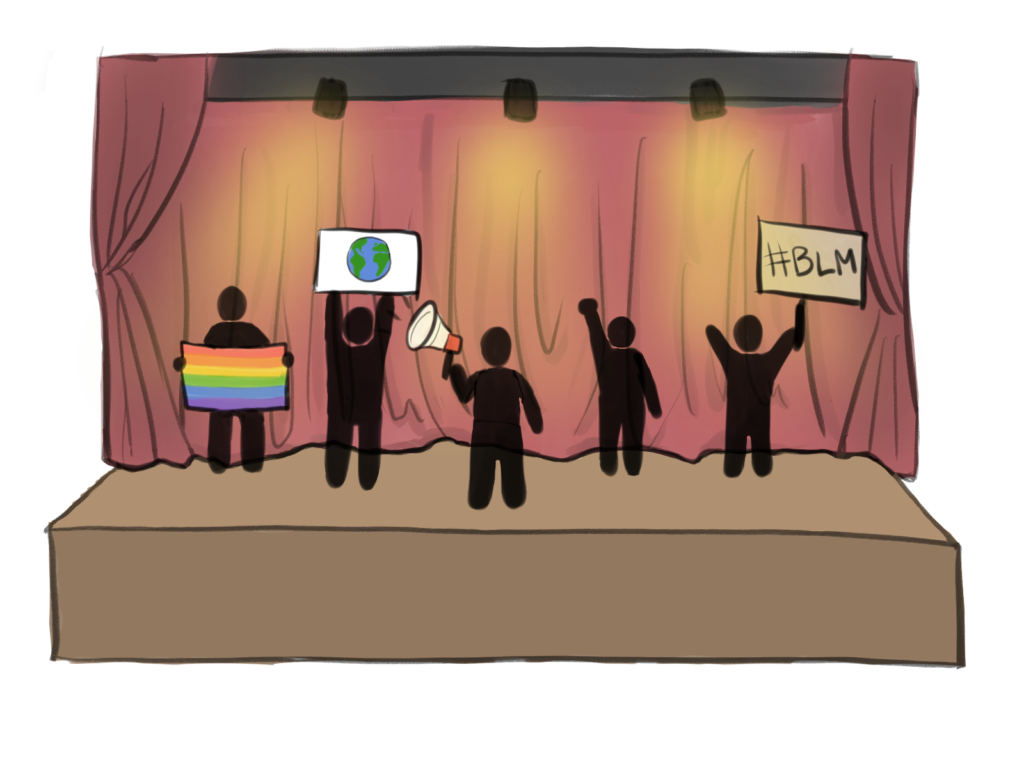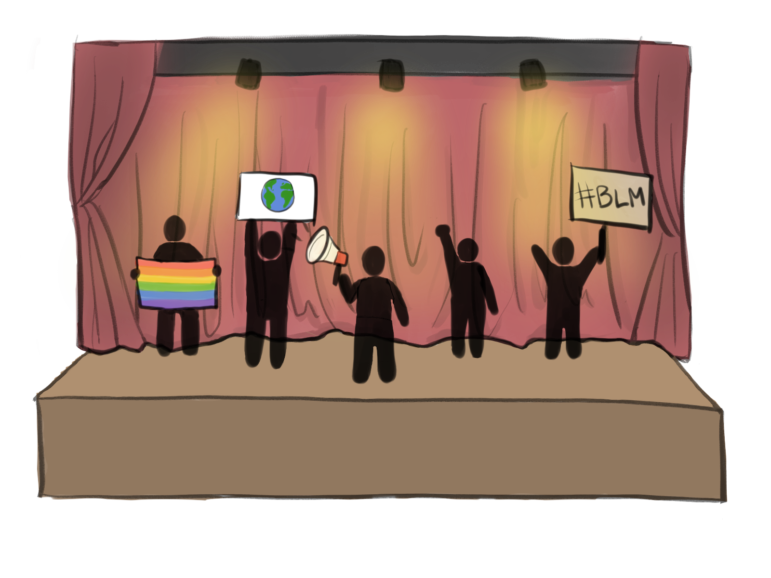

I’ve never posted about any type of human rights issue on social media. Although I have my opinions on some of these issues, I don’t think I truly know enough about these subjects to take a stance on them. That’s where so many people go wrong: not having enough knowledge, but sharing anyway.
Be it posting about a political rally, or big brands creating rainbow collections during Pride month, performative activism can fall on a wide spectrum. Many who engage in performative activism have surface-level motives for supposedly promoting societal issues.
“I recently saw a video [of] people in a protest in [San Francisco]. There was someone interviewing them about the [Israel-Palestine conflict]. They would be asked specific questions, and they wouldn’t know the answer to them. A lot of performative activists jump on the bandwagon of something. They don’t learn the actual information behind it. This really easily spreads misinformation. People who saw those interviews might think, ‘Oh, this topic isn’t as serious because these people don’t even know what they’re talking about.’ You don’t want that to happen because the protests do have meaning.”
Olivia King (11)
Although posting about an issue can be important to spread awareness, overall it is not very useful. It is superficial to say one thing, or seemingly promote the “right” side of the cause without truly understanding the weight of the situation. Sometimes, people’s actions contradict what they are apparently supporting.
In fact, many celebrities have been “canceled” for putting up an act to tell others they are rooting for a good cause, but there is an incredible amount of hypocrisy in many of their statements. One of the best examples are “nepotism babies”— people who grew up in the upper class with wealth and connections — who use that advantage to build their own successful careers. These are people who especially don’t understand or refuse to understand the deeper reason for making activist statements, hiding behind their privilege and money. They wear metaphorical horse blinders, oblivious to the amount of damage they could be causing through their actions.
While some celebrities simply click and post about current social justice issues, others do actively donate to charities and foundations supporting the cause or participate in boycotts and rallies. Award-winning American actress Jane Fonda is a great example who supports many movements by speaking at assemblies and attending events. She makes an active effort, stepping out of the comfort of her home and truly engaging.
However, one type of performative activism I think always deserves criticism is when brands and companies supposedly support a cause for show. There are so many companies that create collections or lines for specific causes; the most common example being a Pride collection. They promote lines that incorporate rainbows for the LGBTQ+ community and yet don’t actively donate to a foundation or truly help the cause. Many even support bills that actually contradict what they say they’re advocating for.
For instance, even though some companies like Amazon, Home Depot and AT&T have a law banning discrimination against LGBTQ+ employees in the workplace and have high scores on the Human Right Campaign’s Corporate Equality Index, many of them have reportedly donated money to lawmakers who supported anti-LGBTQ+ bills.
“When celebrities claim a side based on their audience’s opinion or the majority of what their audience appears to support, I don’t think that’s as harmful because they’re not actively supporting the opposition. But I think that it is ignorant to become a celebrity and expect to be neutral on every topic. When you are a celebrity, especially in our society, their opinions are valued over so much else. And it comes with responsibility.”
Emerson Makuta, (10)
In a mix of individual and corporate performative activism, media personality Kim Kardashian promoted her brand SKIMS’s new nipple bra via Instagram Reels, joking about global warming and climate change. The caption states that SKIMS will donate 10% of sales to environmental organizations, but according to the website Good on You’s sustainability rating, SKIMS ranks the worst at “avoid.” The company and Kardashian make extremely vague statements about their ethical practices, hinting at how little the company cares for sustainability, despite donating a percentage of profits to “support people and the planet.” Kardashian seems to not care for the planet’s actual well-being, and why would she, when she and so many other nepotism babies aren’t affected because they have enough money and privileges to fall back on.
“[Companies] know that in this generation, lots of people are supportive [of the LGBTQ+ community], so if they see something that has an LGBTQ+ logo on it, they [might] buy it to spread awareness. But this company is just getting money out of it, … they don’t actually do anything with that money to raise awareness.”
Anna Gevorgyan (10)
Unlike this SKIMS’s marketing technique, it is often difficult to distinguish companies creating collections to increase visibility and awareness for an issue from brands whose only interest is financial gain, funding lawmakers and bills that restrict and push back on these issues. It is absolutely unfair when this happens.
There are many large corporations and oblivious individuals who say they support an important global issue, but act the opposite. Yet, sometimes it is extremely hard to differentiate between those who truly believe the causes they promote and those who don’t. Still, many of them profit or gain popularity from their supposed promotions, even when it often has damaging effects.




